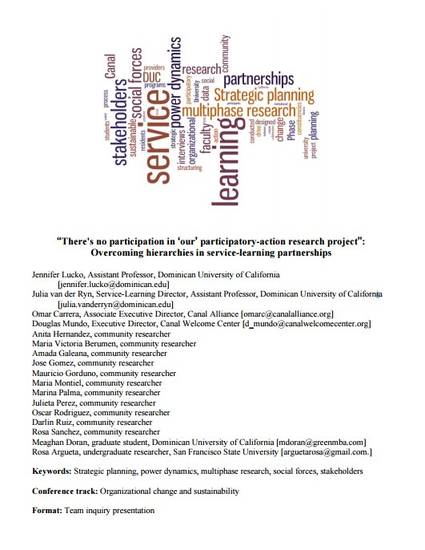
Presentation
“There's No Participation in ‘Our’ Participatory-action Research Project”: Overcoming Hierarchies in Service-learning Partnerships
International Association of Research in Service-Learning and Community Engagement Conference
(2013)
Abstract
While strategic planning is widely recognized as a central component in the development of sustainable service-learning partnerships and university programs, institutions working to create organizational change often do not have a framework for how to address the power differentials among a diverse group of constituencies. Further, this framework should include all stakeholders in the analysis of the social, historical, and political contexts around service-learning partnerships.
In this study, participants in the service-learning program at Dominican University of California (DUC) explored the complexity of the social forces that influence communication and collaboration in service-learning. DUC faculty members designed a multiphase research project to integrate institutional planning and policy making with community strategic planning to build sustainable service-learning partnerships in the Canal neighborhood that borders the university. Phase One: Undergraduate students enrolled in the colloquium course conducted interviews of administrators and direct service providers of organizations in the Canal. Phase Two: DUC faculty and staff conducted follow-up interviews of selected faculty and surveyed undergraduate students participating in service-learning classes. Phase Three: Canal residents designed and implemented a participatory action research project to collect qualitative and quantitative data from Canal residents with the support of DUC faculty, DataCenter, and community service-providers.
Data was drawn from coded field notes, survey responses, and recorded and transcribed interviews collected during each phase. Our findings indicate that participatory action research is a collaborative, inclusive process that serves to break down existing hierarchies in service-learning partnerships and fosters a common basis of understanding across constituencies that can be used to drive organizational change. The new understandings and relationships forged through the research process was used to drive organizational change in service-learning policies and practices—both in the community and at the University—that will lead to more sustainable service-learning partnerships.
Keywords
- Strategic planning,
- power dynamics,
- multiphase research,
- social forces,
- stakeholders
Disciplines
Publication Date
September 29, 2013
Location
Baltimore, MD
Citation Information
Jennifer Lucko, Julia van der Ryn, Omar Carrera, Douglas Mundo, et al.. "“There's No Participation in ‘Our’ Participatory-action Research Project”: Overcoming Hierarchies in Service-learning Partnerships" International Association of Research in Service-Learning and Community Engagement Conference (2013) Available at: http://works.bepress.com/julia_vanderryn/6/
